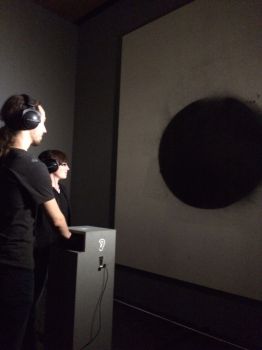Sussex scientists bring the art of touch to the Tate
By: James Hakner
Last updated: Tuesday, 12 June 2018

Damien Ablart (PhD student) and Dr Marianna Obrist (Head) of the SCHI lab demonstrate their contribution to Tate Sensorium, using touch and sound to provide visitors with a new way of experiencing Full Stop (1961) by John Latham.
The Tate Britain gallery in London is this week starting an experiment with art that engages all our senses – and University of Sussex scientists are helping to ensure that visitors leave the gallery touched by the experience.
Dr Marianna Obrist and her team in the Sussex Computer Human Interaction (SCHI) lab have used their expertise on haptics – technology that stimulates our sense of touch – to help create Tate Sensorium, a new immersive art experience that opens tomorrow (Wednesday 26 August).
Dr Obrist and her team - Damien Ablart and Dr Carlos Velasco - worked alongside a sound engineer, a master chocolatier and a perfumist to create the new installation, which engages our senses of touch, taste, smell and hearing, as well as sight.
Developed by the London-based creative studio Flying Object, Tate Sensorium is the winning project of the IK Prize 2015, awarded annually for an idea that uses innovative technology to enable the public to discover, explore and enjoy British art from the Tate collection in new ways.
By programming and installing a piece of technology developed by Ultrahaptics, the team are able to use ultrasound to create patterns of air on the palms of Tate visitors.
Dr Obrist said: “It is quite an intriguing experience. While you are looking at the painting, you are listening to a soundscape through headphones and also receiving haptic stimulation on your hand.
“Some people who have tried it out have said it feels a bit like a sphere or tunnel made out of air, or like a shape that you can’t quite get hold of. There is a section at the end that feels a bit like raindrops on your palm, which is reflected in the soundscape and in the painting itself.
“It will be interesting how people react to the experience. We really hope they like it.”
Tate Sensorium has already received coverage in the media, featuring in The Observer and on BBC Radio 4's 'Today' programme; a video of the exhibition was shown on BBC One's 'Breakfast' show and is also available on the BBC News website.
Dr Obrist is part of a rapidly growing body of researchers who are unravelling the surprising impact our neglected senses have on the way we feel and think. She has just this year been awarded one million euros by the European Research Council to explore the multisensory technologies of the future.
Dr Obrist said: “This is an incredibly exciting area of research and we are just at the beginning of this journey studying touch, taste, and smell for interactive technologies.
“Our findings so far have shown that haptic technology can evoke specific emotions by stimulating particular parts of your hand.
“Taste and smell is a bit behind touch technology-wise, but we still have some exciting projects on the go.
“The future of entertainment is in technology that engages all your senses. The way that we experience TV, cinema, games, galleries, museums and so on is going to be very different in 10 years’ time.”
